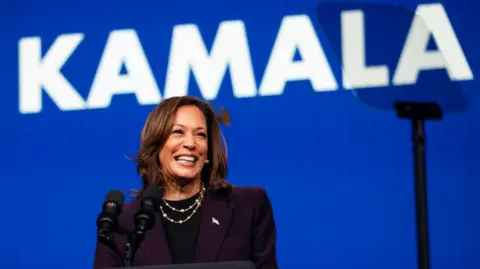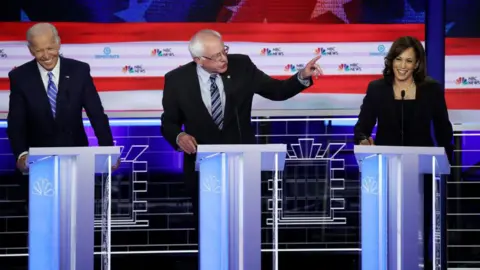 Getty Images
Getty ImagesAt a moment of unprecedented turbulence in modern American political history, Kamala Harris is having a remarkably smooth ride. It may not last long.
Tony Fabrizio, Donald Trump’s campaign pollster, calls it a “Harris Honeymoon” – where a combination of good press and positive energy have combined to give the Democrat a surge of momentum.
The thing about honeymoons, of course, is that they come to an end. The realities of married life, or in this case the relationship between Ms Harris and the American voting public, has a way of reasserting itself.
For now, the champagne corks are flying for team Harris and Democrats may be experiencing an unfamiliar emotion – hope. But Republicans, after initially being caught somewhat flatfooted by Mr Biden’s historic announcement, are redirecting their fire at the new presumptive nominee.
Here’s a look at three areas on which their recent attacks have focused – and some ways Democrats may try to deflect them.

1. Calling Harris a ‘radical’ leftist
The travails of Ms Harris’ unsuccessful campaign for the 2020 Democratic presidential nomination are well documented. They include a lack of clear messaging, a campaign rife with internal discord and a candidate who was prone to awkward interviews and gaffes.
Something else happened during the then-senator’s ill-fated presidential bid, however. She – like many of the candidates in that race – tacked sharply to the left, to be more in line with Democratic primary voters.
“There was a lot of pressure on those guys from the activist base,” said Matt Bennett, the executive vice-president for public affairs at Third Way, a centrist Democratic think tank. “When you’re competing in a primary, your political priorities are very different than the sprint to the finish in a general election.”
Over the course of 2019 – in debates and interviews – Ms Harris endorsed scrapping private health insurance for a government-run system. She praised policing reform, including redirecting law-enforcement budgets to other priorities. She endorsed decriminalising undocumented entry into the US and entertained abolishing Ice, the immigration and customs enforcement agency. She backed the sweeping Green New Deal environmental legislation and supported a ban on fracking and off-shore drilling.
Now those positions could come back to haunt her.
 Getty Images
Getty ImagesDavid McCormick, a Republican candidate for Senate in Pennsylvania, was quick to produce a television advertisement hitting on Ms Harris’ 2019 positions and tying them to his opponent, Democratic Senator Bob Casey.
And Trump has released a video titled “MEET SAN FRANCISCO RADICAL KAMALA HARRIS” that includes many of the policies she backed during that time.
Conservative commentator Matt Walsh called it a “blueprint” for how to attack the vice-president.
“She can argue, correctly, that good leaders change their position on policy and they don’t change her principles,” Mr Bennett, the Democratic strategist, said. “None of her principles have changed.”
If she doesn’t do that convincingly, she could lose support from independent and undecided voters that will determine the outcome of the election in key swing states.

2. Tying Harris to Biden’s record
Polls show the Biden campaign had been floundering for months. His immigration policies were unpopular. Even though inflation has eased and the economy is growing, voters still blamed him for higher prices. His ongoing support for Israel in the Gaza War was sapping his support among young voters.
Ms Harris, in her role as vice-president, will at least be somewhat tied to the entirety of the current administration’s record – for better or for worse.
Republicans are already trying to hang the immigration issue around her neck, labelling her as the administration’s “border czar” – an inaccurate but damaging characterisation that was also used by the media. They cite her past statements on immigration and a claim, during an interview in 2022, that the “border is secure”.
“Kamala Harris is currently only known as a failed and unpopular vice-president who knifed her boss in the back to secure a nomination she couldn’t earn, but voters are about to learn, it gets worse,” Taylor Budowich, who runs the political action committee affiliated with the Trump campaign, said in a statement touting $32m in upcoming television advertisements targeting the vice-president.
 Getty Images
Getty ImagesAccording to Mr Bennett, Ms Harris won’t be able to fully distance herself from the Biden record, but she might be able to put it in new light for voters, even in the face of Republican attacks.
“What she can do is make this about the future in ways that were going to be very difficult for an 81-year-old guy to do,” he says. “She can argue that Trump wants only to look backward.”

3. Attacking her years as a prosecutor
In the first public rally of her presidential campaign, Ms Harris unveiled a particularly pointed line of attack against the former president. Noting that she had served as a courtroom prosecutor and as California’s attorney general, she said she had faced off against “perpetrators of all kinds”.
“So hear me when I say known Donald Trump’s type,” she concluded.
Craig Varoga, a Democratic campaign consultant and adjunct instructor at American University, calls the vice-president’s law-enforcement background her “superpower” – one that she was not fully able to use on the Democratic campaign trail in 2019, when policing reform was a top issue.
But Trump’s campaign is already showing signs on how they might respond. His campaign manager, Chris LaCivita, made his bones in the Republican Party by taking on another Democratic candidate’s supposed superpower and turning it against him.
Back in 2004, Democratic nominee John Kerry was touting his record as a decorated Vietnam War veteran as proof that he would be an effective commander-in-chief during the Iraq War. Mr LaCivita spearheaded a series of attack adverts questioning Mr Kerry’s patriotism and heroism, featuring sailors who served with Kerry on a Navy swift boat patrolling the rivers and shorelines in Vietnam.
It gave rise to the term “Swift-boating” – which means to disarm a candidate by attacking their perceived strength.
And it looks like Trump’s campaign is gearing up for attacks on the vice-president’s prosecutorial record.
On one hand, they are hitting her for being too tough – particularly on black men for drug crimes – in an attempt to undermine support from her base. On the other, they are citing instances where Ms Harris either chose not to prosecute or allowed the parole of individuals who went on to commit new crimes.
Mr Varoga concedes that Democrats botched their response to the Swift-boat attacks in 2004, but he says they’ve learned their lesson and Ms Harris will be ready for the onslaught.
“If LaCivita thinks he’s going to fool the entire Democratic establishment again, he can live with that delusion and also lose,” he said.

A race to define Harris
In his memo, Mr Fabrizio said that Ms Harris “can’t change who she is or what she’s done”. He promised that voters will soon view her as Mr Biden’s “partner and co-pilot” and learn about her “dangerously liberal record”.
The upcoming advertising onslaught, along with Trump’s public statements and rally attacks, will be the tip of this Republican spear.
Meanwhile, Ms Harris and her campaign will work to offer their own definition of who the candidate is and what she stands for.
One particularly effective way to do this, according to Mr Varoga, is with her selection of a vice-presidential running mate.
“It’s the first real decision that a candidate for president makes that’s out there for the public to see,” he said. “That will go a long way toward people understanding what kind of future she’s going to pursue.”
If she opts for a more moderate partner, it could make voters more inclined to believe that she will govern from the centre, rather than as the leftist candidate Republicans make her out to be.
In the weeks ahead, the fight to define Ms Harris – through her word, through her votes and through her past campaigns – will go a long way toward determining how the public views her when they head to the ballot box in November.
It will shape whether the honeymoon ends in heartbreak for Democrats or a union that lasts for the next four years.






